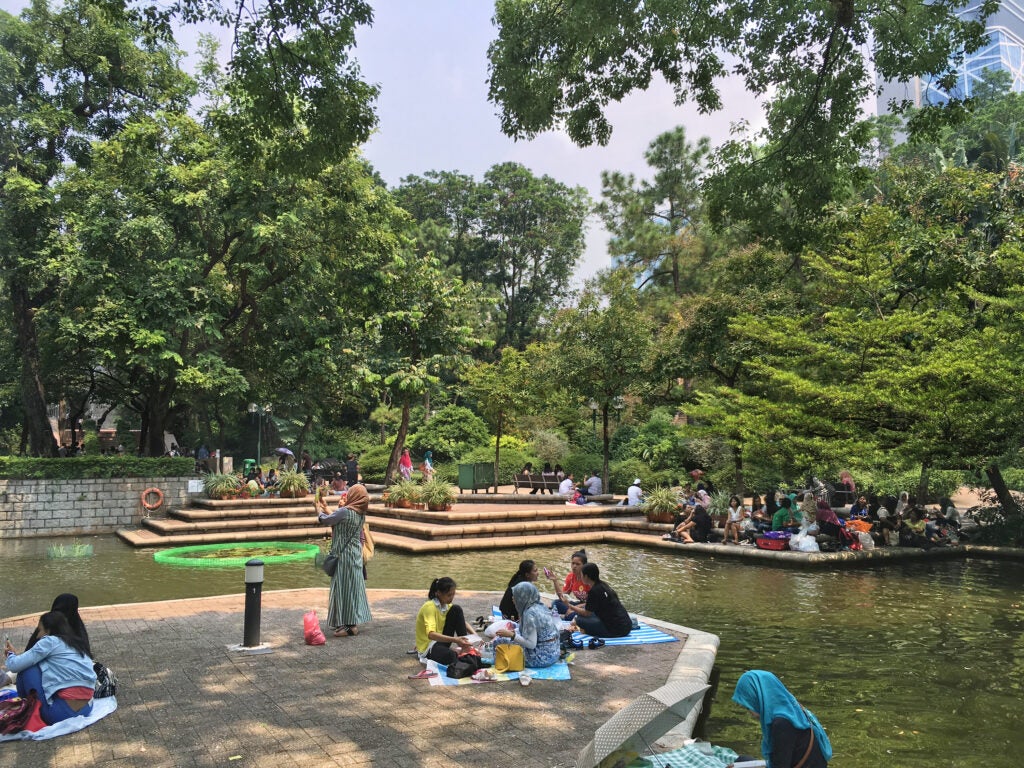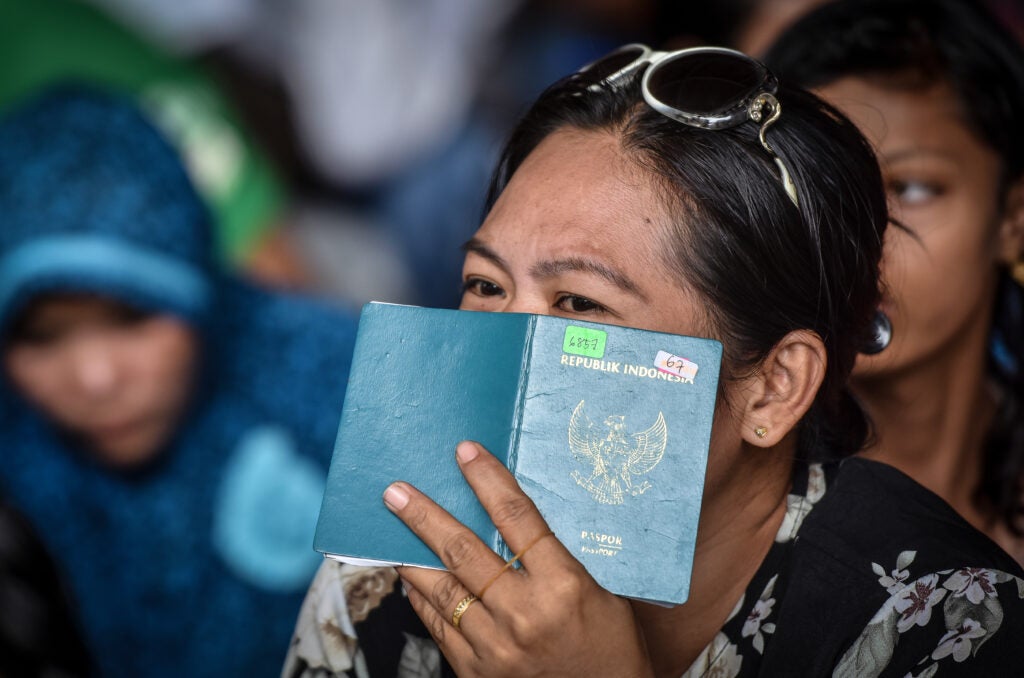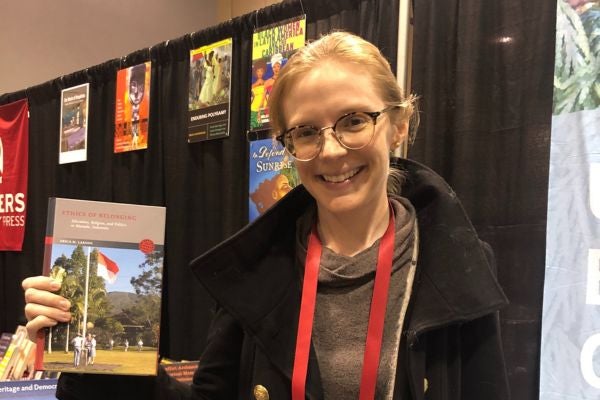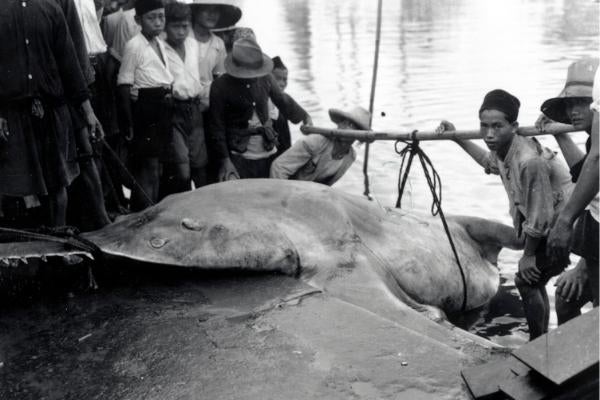Politicisation Processes: Migrant Politics and Labour Migrations between Indonesia, Singapore and Malaysia
Since the 1970s, major transnational labour migration flows have been taking place in Southeast Asia. Today, Indonesians “dominate” the foreign workforce in Malaysia, Taiwan, and Hong Kong and are engaged in the service and construction industries, plantation work and as domestic workers or caregivers. Even if figures remain vague, Indonesians, numbering around 127,000, are estimated to make up half of the foreign domestic helpers’ segment of the labour market in Singapore. My ongoing research project looking at Indonesian migrant workers’ geographic mobilities is based on fieldwork in Indonesia, Singapore and Malaysia (Kuala Lumpur), the latter two countries being among the main labour importers in the region. At the regional level, these mobilities impact national politics as well as bilateral relations within ASEAN, generating frequent tensions between sending and receiving countries. Following recurring cases of abuse towards Indonesian domestic helpers in Malaysia, Indonesia had promulgated a moratorium on sending maids to Malaysia lasting between 2009 and 2011 (a shorter ban was imposed in 2022). Similar clashes had occurred repeatedly over the 2010s, often adding tensions to other bilateral disputes and resulting in political and legal adjustments regarding the regulation of transnational labour migration.
In this broad context, this research project focuses specifically on Indonesian female domestic workers’ politicisation processes and political practices in and between Indonesia, Singapore, and Malaysia. The aim is to study the relationship between individual politicisation processes generated by migration—a well-documented phenomenon in migration studies—and the emergence and shaping of collective mobilisations. These collective efforts are mainly in the form of advocacy, political lobbying, and outreach campaigns, sustained by coalitions of migrant and non-migrant actors between the three countries. To examine these processes more closely, I introduce the concept of “migrant politics” which encompasses both overt and more discrete political practices undertaken by Indonesian domestic helpers in Singapore and Malaysia, as they navigate systemic constraints and seize opportunities to assert their social, economic, and political agency.
Migration and politicisation
For Indonesian workers in Singapore and Kuala Lumpur, migration entails multiple breaks with life back home. It involves moving from a rurality to an urban lifestyle in a major regional metropolis, living away from families and home communities in a foreign country, being exposed to a broad variety of unfamiliar social experiences such as depersonalisation of social relationships in the city, new sociabilities, unfamiliar gender relations, social and administrative relations as non-citizens, new access to urban resources and amenities, and so on. And all this while being away from family and community supervision.
In both cities, migrants develop new practices that are rooted in these experiences as they adapt to their new environment. Increasingly, these adaptations are collectively negotiated, thereby providing new resources to support individual experiences. In the case of Singapore, numerous groups attending to migrant workers in low-paid jobs have recently flourished, some created and ran by migrants themselves, thus broadening the scope of activities/services available to them. A timely illustration is the increasing participation of foreign workers in the local arts scene over the past decade through initiatives such as the Migrant Writers of Singapore. Through these activities, Indonesian migrants are able to explore and generate new imaginaries, growing new expectations and aspirations for their life circumstances abroad, their situation back home, and their future lives. In the process, new claims emerge.
Many of these activities, experiences and aspirations are, however, quite subversive in both the broader Singaporean and Malaysian societies where they work and to the migrant workers’ home communities. For women, romantic and sexual relationships outside of marriage, whether beyond their national, religious, or ethnic communities or with local citizens, serve as a striking example. These relationships often provoke strong negative reactions and are frowned upon because they deviate from prevailing social norms, both at home and abroad. Besides the social contempt they face as “bad women”, there are also other significant opportunity costs such as unwanted pregnancies and blacklisting in destination countries. The occupation of public urban spaces and the creative “hijacking” of public amenities by foreign workers on their day offs, such as around Lucky Plaza or City Plaza in Singapore are another example of such disruptive practices as they go against their assigned position in the private household space in local society. Although generally stigmatised, such practices nevertheless have gained acceptance and even recognition among small peer groups in Singapore and Malaysia and within certain segments of local society.
 The occupation of public urban spaces and the creative “hijacking” of public amenities by domestic workers on their day off are seen as a disruptive practice. Credits: Shutterstock.
The occupation of public urban spaces and the creative “hijacking” of public amenities by domestic workers on their day off are seen as a disruptive practice. Credits: Shutterstock.
These practices bear no obvious political dimension as they do not take the form of explicit claims or contentions. Yet they do constitute a contest to migrant workers’ position in the host society and back home. These workers reclaim access to public spaces and develop practices reflecting their own aspirations, thus subverting their social, political, and economic reduction to working bodies. In doing so, they engage in what James Scott refers to as “infrapolitics” or practices that are not explicitly nor often intentionally political, yet carry a political weight by de facto subverting established norms.
However, other practices display more explicit claims. In Hong Kong in 2005, for example, transnational workers of different nationalities, among them a broad majority of foreign domestic helpers, protested in front of their respective consulates demanding better status and better protection. Taiwan, with its many migrant unions and organisations, is the cradle of migrant worker activism in Asia. But in Singapore and Malaysia, the move is more calibrated and recent.
In the city-state of Singapore, migrants’ concerns and aspirations have been increasingly voiced since the mid-2010s through the arts – writing, exhibitions, performances, etc. In Malaysia, Indonesian workers successfully organise and created the Indonesian Migrant Domestic Workers Association (PERTIMIG) in 2019 with the help of the International Domestic Workers Federation (IDWFED). The combination of these two types of political practices—whether they are explicitly political or not—constitute what I call “migrant politics”.
Migrant politics in context
In Singapore and Kuala Lumpur, low-paid migrant workers face unequal opportunities in their attempts to realise their individual aspirations. The constraints in both cities shape the forms of migrants’ political practices. This makes the fieldwork in Kuala Lumpur where the legal status of foreign workers varies between legality and irregularity especially relevant. Paradoxically, this plurality of statuses can lead to extreme exploitation and increased autonomy, as it allows migrants to evade the stringent legal constraints and administrative control faced by “regular” migrants. In Singapore, the pervasive bureaucratic system of surveillance and law enforcement limits the agency of migrant workers to renegotiate their prescribed roles. Back in Indonesia, workers recover the full range of rights attached to their citizenship.
These “strategic action fields” in the three countries shape specific opportunities in each location for migrants to publicise their concerns.
In Singapore, NGOs advocating for foreign workers' rights have gradually gained a form of public acceptance, albeit within a carefully negotiated space. These NGOs are de facto recognised by public authorities as essential stakeholders in addressing foreign labour issues, maintaining a continuous, albeit fraught, dialogue with relevant government agencies such as the Ministry of Manpower (MOM). Informal groups of foreign workers have flourished in parallel, often operating under the umbrella of these NGOs. These groups typically focus on one or multiple types of activities, such as assisting fellow workers, organising Sunday leisure activities, and offering vocational training.
In Kuala Lumpur, NGOs like Tenaganita that advocate for migrants’ rights have been operating in a precarious space between limited tolerance and aggressive repression. However, the political landscape has shown signs of becoming somewhat more permissive after Pakatan Harapan’s unexpected 2018 election victory, as indicated by the recent establishment of PERTIMIG.
 Back in Indonesia, workers recover the full range of rights attached to their citizenship. Credits: Shutterstock.
Back in Indonesia, workers recover the full range of rights attached to their citizenship. Credits: Shutterstock.
The cooperation among migrant groups, local NGOs, and transnational partners gives rise to a unique form of “popular politics”, which engages both migrant workers and institutional stakeholders. This cooperation creates distinct spaces where the concerns and agendas of migrants and institutional actors intersect, facilitating the articulation and negotiation of new claims. A notable result of such collaborative effort was Indonesia’s 2017 new law on the protection of migrant workers that strengthened their protection throughout the migration process—recruitment, placement, work, and reinstallation.
These networks and international linkages are expanding and broadening the space available for migrants’ political practices. In Indonesia, NGOs such as Jaringan Buruh Migrant (JBM), Migrant Care, Serikat Buruh Migran Indonesia (SBMI), the Association of Indonesian Migrant Workers in Indonesia (ATKI-Indonesia) and other such groups involve former migrants, coordinate collective mobilisations, carry out continuous advocacy work, and engage in constant political pressuring to advance Indonesian workers’ rights and protections abroad.
In the context of these mobilisations, migrant workers and supporting organisations—NGOs, political parties, trade unions—negotiate their position and contribute to (re)framing transnational labour as a public issue. A continuum is thus emerging between migrants’ politics and institutional forms of collective interventions in the public sphere (media, political debates, etc), and policy change.
Translating migrant politics in the public sphere
However, the relationship between migrant political practices and more institutionalised types of action is not straightforward. This complexity arises primarily because publicising migrants' concerns, claims, and expectations entails reframing them in publicly acceptable language.
This was evident when in 2015 Indonesian NGOs opposed President Jokowi’s proposed ban on sending Indonesian domestic helpers abroad. The arguments put forward by activists on this occasion were based on juridical (the human right to employment) and economic considerations (the impact of such measures on the economic well-being of migrants’ households), or related to the anticipated risk of increasing irregular migration by closing legal channels.
 New claims are gradually emerging for migrant workers. Shutterstock.
New claims are gradually emerging for migrant workers. Shutterstock.
In these public discourses, the quest for increased autonomy from familial and community constraints was notably absent, even though this factor serves as a significant driver for migration among many women who have no other means to gain greater autonomy in their places of origin. This publicly justified reason for migration hides their intimate but stigmatised motivations. One particular aspect of the migrant condition, especially for women, lies in the challenge of conveying their lived experiences to the broader society in the three countries in a way that gains social legitimacy.
This research aims to dissect the multifaceted relationship between migrant and institutional politics by considering processes such as negotiation, translation, and “interessement” (the group of actions by which an entity attempts to impose and stabilize the identity of the other actors it defines through its problematization) with a range of institutional actors. This study aims to clarify both the impact of these interactions on transnational labour regulations between the neighbour countries and their formative influence on migrants’ subjectivities. The goal is to comprehend the mutual shaping of these three interdependent levels. Thus, the study addresses the reciprocal influences across these interconnected dimensions of transnational regulations, institutional frameworks, and individual agency.
The views expressed in this forum are those of the individual authors and do not represent the views of the Asia Research Institute, National University of Singapore, or the institutions to which the authors are attached.
Dr Bastide is a Research Fellow at the Research Institute on Contemporary Southeast Asia, and a Visiting Senior Research Fellow at ARI. Dr Bastide has worked extensively on transnational migration in Southeast Asia (Singapore, Malaysia, and Indonesia) since 2015. Dr Bastide has been awarded a research fellowship by the French Centre for Scientific Research. While at ARI, he will develop the research project “Repoliticising transnationalism: migrant women and migrant politics between Indonesia, Malaysia, and Singapore”, which aims to develop political sociology of transnational labour in the three countries through the lens of Indonesian migrant women.









